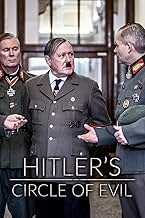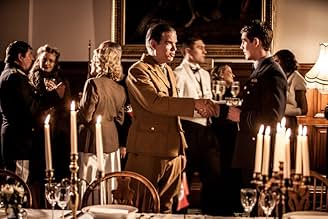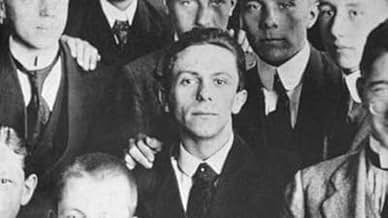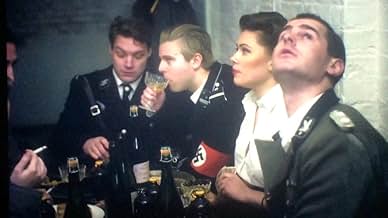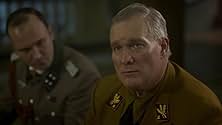Segui l'ascesa e la caduta del Terzo Reich attraverso le relazioni personali dei membri influenti e importanti del Partito nazista.Segui l'ascesa e la caduta del Terzo Reich attraverso le relazioni personali dei membri influenti e importanti del Partito nazista.Segui l'ascesa e la caduta del Terzo Reich attraverso le relazioni personali dei membri influenti e importanti del Partito nazista.
Sfoglia gli episodi
Recensioni in evidenza
This is an excellent doc on the inner workings of the Nazi top tier of characters. The re-enactments are well done, some of the actors don't look anything like their real life counter-parts but I guess they took what actors they could. Tons of little seen and rare footage. The historians give a balanced account of these horrible men in-the-making rather than the standard they are totally evil repugnant creatures stance seen in more unbiased documentaries that only serve to distance and turn-off the viewer and possibly taint the lessons needed to be learned by the Nazi era. This doc could easily have been named "Absolute Power corrupts..."
I find the suggestions in some of the reviews that the Nazis were NOT irrational disturbing. There is one major argument to be made *for* their rationality: that the objectives of WWII were the same as WWI, and no one calls Kaiser and his crew irrational or nuts. On the other hand the military campaigns, in spite of the success against Poland and France, were nuts, as was the huge diversion of resources to the holocaust. Hitler's chief engineer Fritz Todt told him the Germans were going to lose in October 1941 and that he should negotiate a German withdrawal with Stalin. (whoops! sorry bout that!) But, even so, the series is explicit about the talents of some of these men: Goebbels was a capable orator, Goring seemed to have a better appreciation of grand strategy than most of the other party luminaries, Himmler had strong bureaucratic and organizational skills. They are really depicted as rational agents in thrall to an irrational ideology.
But what about the series? It is one of many possible ways to get into the vast and complicated topic that is WWII. The focus on domestic politics leaves out some important issues, such as the Soviet-German pact to divide Poland, but this series is not really about "total context." This series is about the personalities of the Nazi party. It helps you distinguish who was who, Goring from Goebbels, Himmler from Heydrich, Hesse, and so on. You don't get the generals. Just the major Nazi party figures.
If you watch this series with an extra resource, and every now and then pause the presentation to look up this or that, you will find it a useful way to get the feel of the Third Reich's major politicians. If you want a printed resource try the Oxford (single volume) encyclopedia of WWII. Or alternatively, take the time to use your tablet or phone to look up some of the topics that interest you on Wikipedia.
Almost any one of the WWII documentaries is *better*. For example, the famous "World at War" series from the 1970s. However, in that series, as you zip around battles and generals and politicians on both sides of the Atlantic and in Asia, you lose sight of the inner circle. The narrow focus of this series, in spite of its repetitive reality-show-ish format, is a very good first step into learning about the war and why these guys were hanged at Nuremberg (those that they could round up). As is often the case for such a complicated topic, every now and then something drops that I hadn't thought of, even though I have read a lot about WWII. For example, the series' argument that the plan to deport the Jews to Madagascar had to be shelved because the Germans lost the Battle of Britain (thus leaving the British with supremacy on the seas) was interesting. Very likely the Nazis would have gone ahead with extermination anyhow, but there are interconnections that I haven't made before. That Heydrich chaired the Wannsee conference was something else that had slipped my attention, even though I knew about the Wannsee conference. Goring's control of Prussia and its police/domestic espionage operation were news to me. The role of Martin Borman as a puppet master is also highlighted by the series, even though many treatments of the war tend to keep him in the background.
So all in all there's some good material in here. If this were the Michelin Guide I would give it a one star meaning "worth the trip." So I think this offers something to the WWII buff and it is also an interesting side trip if you find your regular viewing derailed by erratic shooting schedules. My main current series (such as Expanse, Babylon Berlin, and Game of Thrones) are all in suspension. If you like history and want to stream something that has a relatively short span from beginning to end this is a good option. The Germans lose WWII. Is that a spoiler?
But what about the series? It is one of many possible ways to get into the vast and complicated topic that is WWII. The focus on domestic politics leaves out some important issues, such as the Soviet-German pact to divide Poland, but this series is not really about "total context." This series is about the personalities of the Nazi party. It helps you distinguish who was who, Goring from Goebbels, Himmler from Heydrich, Hesse, and so on. You don't get the generals. Just the major Nazi party figures.
If you watch this series with an extra resource, and every now and then pause the presentation to look up this or that, you will find it a useful way to get the feel of the Third Reich's major politicians. If you want a printed resource try the Oxford (single volume) encyclopedia of WWII. Or alternatively, take the time to use your tablet or phone to look up some of the topics that interest you on Wikipedia.
Almost any one of the WWII documentaries is *better*. For example, the famous "World at War" series from the 1970s. However, in that series, as you zip around battles and generals and politicians on both sides of the Atlantic and in Asia, you lose sight of the inner circle. The narrow focus of this series, in spite of its repetitive reality-show-ish format, is a very good first step into learning about the war and why these guys were hanged at Nuremberg (those that they could round up). As is often the case for such a complicated topic, every now and then something drops that I hadn't thought of, even though I have read a lot about WWII. For example, the series' argument that the plan to deport the Jews to Madagascar had to be shelved because the Germans lost the Battle of Britain (thus leaving the British with supremacy on the seas) was interesting. Very likely the Nazis would have gone ahead with extermination anyhow, but there are interconnections that I haven't made before. That Heydrich chaired the Wannsee conference was something else that had slipped my attention, even though I knew about the Wannsee conference. Goring's control of Prussia and its police/domestic espionage operation were news to me. The role of Martin Borman as a puppet master is also highlighted by the series, even though many treatments of the war tend to keep him in the background.
So all in all there's some good material in here. If this were the Michelin Guide I would give it a one star meaning "worth the trip." So I think this offers something to the WWII buff and it is also an interesting side trip if you find your regular viewing derailed by erratic shooting schedules. My main current series (such as Expanse, Babylon Berlin, and Game of Thrones) are all in suspension. If you like history and want to stream something that has a relatively short span from beginning to end this is a good option. The Germans lose WWII. Is that a spoiler?
I've seen a lot of bad critics here and I wanna say something.This is not a documentary that focuses on WWII.Its mostly about the personalities of the people that Hitler had in his circle.Also it kind of showing you how it all started,and as repetitive as it is,cause it is,its very educational and actually did some great work and dig.You dont have to criticize everything that you see,like the costumes,if the buttons were untied,who cares.This is a great show and I highly recommend it to anyone that gets interested on how some people in nazi circle acted, rised up or how it all kind of started.Good work
I just read Erik Larson's book "In the garden of beasts". The book tells you the story of William E. Dodd, american ambassador in Berlin from 1933 to 1937. Recommended! Combined with this series, it gives you a great view on what happened in Germany during that period, and we can only wonder why USA, GB and France didn't do something about it much earlier. They absolutely underestimated the situation. Hitler just wanted time to build his army.
William E. Dodd foresaw all this, and allthough he was criticized by many during that time because of what he said and wrote about what he thought would happen, he was later seen as a prophet they all should have listened to.
"Hitler's circle of evil" is an excellent documentary!
William E. Dodd foresaw all this, and allthough he was criticized by many during that time because of what he said and wrote about what he thought would happen, he was later seen as a prophet they all should have listened to.
"Hitler's circle of evil" is an excellent documentary!
I have to disagree respectfully with the other two reviews on this documentary series, I found it very good and enjoyed it.
This series presents the Nazi high command as people in a way that I had never seen in any previous documentary or book. The writers made good and frequent use of many primary source documents - diaries, letters, court transcripts, memos and other materials - so I would in no way class this as "propaganda." I think this series is an admirable work that probably represents many hours of research and puts together information I had never seen presented like this.
Hitler, Goebbels, Himmler, Goering, Speer and others were not inhuman monsters who just sprang up out of nothing, they were people who behaved monstrously, and neither were they supermen nor military geniuses. This documentary gives a detailed picture of who they were as individuals through how they interacted with each other, and how these monstrous, flawed humans destroyed themselves and their own country.
This series presents the Nazi high command as people in a way that I had never seen in any previous documentary or book. The writers made good and frequent use of many primary source documents - diaries, letters, court transcripts, memos and other materials - so I would in no way class this as "propaganda." I think this series is an admirable work that probably represents many hours of research and puts together information I had never seen presented like this.
Hitler, Goebbels, Himmler, Goering, Speer and others were not inhuman monsters who just sprang up out of nothing, they were people who behaved monstrously, and neither were they supermen nor military geniuses. This documentary gives a detailed picture of who they were as individuals through how they interacted with each other, and how these monstrous, flawed humans destroyed themselves and their own country.
I più visti
Accedi per valutare e creare un elenco di titoli salvati per ottenere consigli personalizzati
- How many seasons does Hitler's Circle of Evil have?Powered by Alexa
Dettagli
- Tempo di esecuzione50 minuti
- Colore
- Proporzioni
- 16:9 HD
Contribuisci a questa pagina
Suggerisci una modifica o aggiungi i contenuti mancanti

Divario superiore
What is the Canadian French language plot outline for Hitler's Circle of Evil (2018)?
Rispondi

